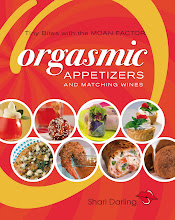
This past weekend my girlfriend Michelle and her new boyfriend invited my husband and I over to their cottage for dinner. Michelle prepared for us a delicious tinfoil feast on the barbecue.
Tinfoil barbecuing is easy and convenient, keeps the grill clean, and produces flavourful and moist foods. The idea is to make pouches from the tinfoil that hold the foods and sit on the barbecue. This style of grilling also allowed Michelle to walk away from the barbecue and spend more time with Jack and I.
Michelle prepared large pouches, each containing various vegetables and fish. She grilled a steak, too, just in case we didn't like fish.
The barbecue itself was small, so she grilled one pouch at a time, putting cooked ones into the oven to keep warm.
Tinfoil pouches require some form of moisture to keep foods from drying out. You can use a couple of tablespoons of salad dressings, sauce, butter, stock, marinade, wine or even water.
Cooking times depend on the heat of the coals. Obviously, the hotter the grill, the faster the foods will cook. Generally, delicate fish take about ten to twelve minutes to cook. Salmon and tuna are thicker and can take about twenty minutes. Hamburger and chicken require from twenty five to thirty minutes. Turn the packages over so each side gets equal cooking time. Keep the lid closed. Opening it too often can add additional grilling time. Be careful if you’re using a fork to check the food for doneness. If the fork punctures the foil, moisture will escape and dry out the foods.
A wide variety of vegetables, such as asparagus, green beans and potatoes can be cooked in tinfoil pouches. Michelle prepared

A wide variety of vegetables, such as asparagus, green beans and potatoes can be cooked in tinfoil pouches. Michelle prepared
three varieties of potatoes, cutting them into thick wedges. She tossed the wedges with organic olive oil and Italian seasoning.

The rosemary in the seasoning demanded a wine with some bitterness. Michelle served a chilled Lindeman’s bin 85 pinot grigio from Southern Australia (CSPC 668947), $10.95. This white had enough weight to stand up to the heaviness of potatoes and offered pleasant bitterness that harmonized with the rosemary in the seasoning. We also enjoyed green beans sprinkled with toasted almonds and crisp greens with Gorgonzola. Pinot grigio worked well with these items, as well.
Our perch was drizzled in lemon juice and sprinkled with finely chopped fresh cilantro. The tinfoil kept the fish tender, moist and scrumptious. The sourness of the lemon juice worked nicely with the refreshing acidity in the wine.
Just as with other styles of cooking, tinfoil barbecued dinners can complement a wide range of wines. When considering a combination of foods in the meal, think about the spices, herbs and sauces. Pair the wine to the most predominant flavours.
If serving several flavours within one meal, choose ones that will likely harmonize with the same wine. A safe approach is to keep the meal simple by adding only salt and pepper. Salt complements the sourness in crisp, dry white wines and mellows the bitterness and astringency in big, heavy red wines.
Our perch was drizzled in lemon juice and sprinkled with finely chopped fresh cilantro. The tinfoil kept the fish tender, moist and scrumptious. The sourness of the lemon juice worked nicely with the refreshing acidity in the wine.
Just as with other styles of cooking, tinfoil barbecued dinners can complement a wide range of wines. When considering a combination of foods in the meal, think about the spices, herbs and sauces. Pair the wine to the most predominant flavours.
If serving several flavours within one meal, choose ones that will likely harmonize with the same wine. A safe approach is to keep the meal simple by adding only salt and pepper. Salt complements the sourness in crisp, dry white wines and mellows the bitterness and astringency in big, heavy red wines.





No comments:
Post a Comment